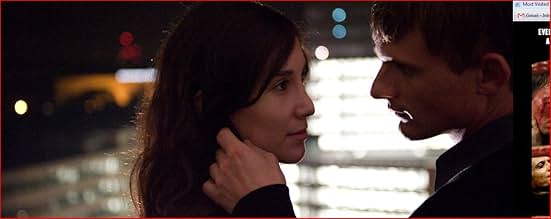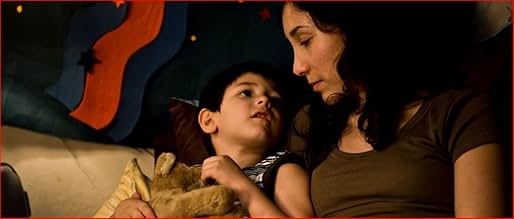IMDb-BEWERTUNG
7,5/10
5663
IHRE BEWERTUNG
Umay, eine junge Frau türkischer Abstammung, kämpft gegen den Widerstand ihrer Familie für ein unabhängiges und selbstbestimmtes Leben in Deutschland. Ihr Kampf setzt eine Dynamik in Gang, d... Alles lesenUmay, eine junge Frau türkischer Abstammung, kämpft gegen den Widerstand ihrer Familie für ein unabhängiges und selbstbestimmtes Leben in Deutschland. Ihr Kampf setzt eine Dynamik in Gang, die in eine lebensbedrohliche Situation mündet.Umay, eine junge Frau türkischer Abstammung, kämpft gegen den Widerstand ihrer Familie für ein unabhängiges und selbstbestimmtes Leben in Deutschland. Ihr Kampf setzt eine Dynamik in Gang, die in eine lebensbedrohliche Situation mündet.
- Auszeichnungen
- 30 Gewinne & 14 Nominierungen insgesamt
Gümeç Alpay Aslan
- Zeynep
- (as Gümec Alpay)
Empfohlene Bewertungen
This kind of story is only really interesting if it is true to life. I don't know what the day to day texture of life tends to be like for Turks in Germany -- I don't even know if the characters are ethnic Turks or Kurds -- so I have to trust the movie. But I don't know whether I should. Yes, the outlines of the plot come from a true story. I can forgive the movie for ignoring that Germany and Turkey have both signed the Hague Abduction Convention, which would allow the father to get his son back. Yes, many parts of the Muslim world share the sense that honor is tied to being able to control one's women, and honor killings happen. Yes, some children in a family may acculturate differently than others. And, yes, it was nuanced. But that does not necessarily mean that the nuances are there in life rather than only in the director's head. Ingmar Bergman comes to mind, and Amos Gitai (some of whose movies I somehow forced myself to watch all the way through). My suspicions were also raised by When We Leave's contemplative quiet, which is common in this kind of art movie but not in real life. But, let me re-emphasize, I don't really know that the picture is a fantasy, I only suspect.
The basic plot is simple: a young lady with a crazy in-laws feds up and leaves making her a total outcast. The acting seemed a bit too dramatic and overly polished. The actors are obviously talented and have done their best, but it showed that they were trying too hard, which took away the realism I was anticipating. More than a few scenes were simply yelling and slapping which I've found quite raw. The close-ups were nice generally with beautiful faces, occasionally with oblique views. At times, when we were shown a scene with people staring at each other silently which meant that the discussion was over, I wondered if that was really the case and not if we were witnessing a zen moment. As a side note, I just have to point out that the subject of film has little to do with religion or being a "muslim". The problem is far too deep which is really a sociological phenomena rooted in dogmatic cultural upbringings and a feudal life style (mostly) of the eastern part of country where people are just a dot in the family picture rather than individuals with autonomy. You could see that nobody in the family wanted to be a part of what was going on but they could not behave otherwise -- they were slaves of their communities even thousands of miles away.
The treatment of Muslim societies in the media in general and in film in particular has been subject to much agenda setting and bias. On the one hand, this has led to frequently arrogant defamation of the cultures of one fifth of humanity, on the other hand, the discourse has helped to highlight problems of Muslim integration which are often ignored under the convenient excuse of multiculturalism. What is more important: respect for other cultures living among us or concern for the plight of the individual subjected to an excessive chauvinism that allows for nothing but submission to it?
Feo Aladag's position on this is clear, but she avoids simplifications by sticking to one woman's story, and keeping that story close, while not identical, to the events that inspired it - namely the much publicized 2005 murder of Hatun Sürücü in Berlin, albeit with a surprising twist. Some may find the depictions of a regressive macho cult in German-Turkish families and social life exaggerated, especially since the acting of the supporting cast is a bit shaky at times. But as someone who has lived in a Turkish neighborhood in Berlin, I have to declare it's not. It's disturbingly close to the truth - not the distorted truth of tabloids, but the truth of people I'm close to.
The minimalistic approach of the film would usually render it a rather harmless affair, in spite of its controversial subject matter - were it not for Sibel Kekilli's outstanding performance, for which she received, among other awards, best actress at the Tribeca festival. Her heartfelt, knowing and yet forgiving gaze at the suffocating world she lives in speaks of personal experience with the role she portrays. 'When we leave' establishes her as the most exciting German actress of today.
It should be noted, by the way, that Islamic law does not condone honorary murders and considers these just as much as crimes as Western law does. Also, this practice is not exclusive to Muslim societies, but used to be widespread in Christian countries as well, where it might still occur as a justification for homicide. But these clarifications could not have been included in this film, which tells one story, and tells it well.
Feo Aladag's position on this is clear, but she avoids simplifications by sticking to one woman's story, and keeping that story close, while not identical, to the events that inspired it - namely the much publicized 2005 murder of Hatun Sürücü in Berlin, albeit with a surprising twist. Some may find the depictions of a regressive macho cult in German-Turkish families and social life exaggerated, especially since the acting of the supporting cast is a bit shaky at times. But as someone who has lived in a Turkish neighborhood in Berlin, I have to declare it's not. It's disturbingly close to the truth - not the distorted truth of tabloids, but the truth of people I'm close to.
The minimalistic approach of the film would usually render it a rather harmless affair, in spite of its controversial subject matter - were it not for Sibel Kekilli's outstanding performance, for which she received, among other awards, best actress at the Tribeca festival. Her heartfelt, knowing and yet forgiving gaze at the suffocating world she lives in speaks of personal experience with the role she portrays. 'When we leave' establishes her as the most exciting German actress of today.
It should be noted, by the way, that Islamic law does not condone honorary murders and considers these just as much as crimes as Western law does. Also, this practice is not exclusive to Muslim societies, but used to be widespread in Christian countries as well, where it might still occur as a justification for homicide. But these clarifications could not have been included in this film, which tells one story, and tells it well.
Umay leaves her abusive husband Kemal in Istanbul with her son Cem to go home to Germany. Her father Kader is concerned about the family's honor. The older brother Mehmet is angry. The youngest brother Acar is scared but kind. Kemal rejects Umay but wants his son Cem back. As Kader and Mehmet try to force the situation, Umay calls the police and she escapes with Cem to a women's shelter. She finds a job with a supportive boss and a new boyfriend. Her younger sister Rana is rejected by her fiancee's father due to the situation. Rana tells her mother that she's desperate to marry Duran because she's secretly pregnant. Kader has to pay off the father to get them married. Umay shows up unexpectedly at the wedding and has a meltdown. Even Acar is forced to confront the lost of family honor.
The portrait of the lost of family honor is devastating. The pressure feels real. The need for Umay to reconnect with her family does feel unreasonable and excessive. I doubt a reasonable Umay would show up at the wedding. After the wedding, it seems impossible for her to go to the hospital especially carrying her son with her. Then the final scene has too many twists. It only accentuates the twisty manufactured nature of the writing. Writer/director Feo Aladag needs to tone down some of the more melodramatic developments in the last act.
The portrait of the lost of family honor is devastating. The pressure feels real. The need for Umay to reconnect with her family does feel unreasonable and excessive. I doubt a reasonable Umay would show up at the wedding. After the wedding, it seems impossible for her to go to the hospital especially carrying her son with her. Then the final scene has too many twists. It only accentuates the twisty manufactured nature of the writing. Writer/director Feo Aladag needs to tone down some of the more melodramatic developments in the last act.
The film she she is a victim of the traditional culture, in the cultural system of human nature, she just husband and home accessories, and is never her own most of the world are all traditional male-dominated roles if which day I hope the human progress in addition to the increasingly advanced technology and the trend of men's and women's position is equal
Wusstest du schon
- WissenswertesGermany's official submission for the Best Foreign Language Film Award at the 83rd Annual Academy Awards in 2011.
- VerbindungenFeatures Biçak sirti (2007)
- SoundtracksSO 36 - Party
Performed by Steffen Irlinger & Marian Mülle
(P) 2010 Colosseum Music Entertainment GmbH
Top-Auswahl
Melde dich zum Bewerten an und greife auf die Watchlist für personalisierte Empfehlungen zu.
- How long is When We Leave?Powered by Alexa
Details
- Erscheinungsdatum
- Herkunftsland
- Offizielle Standorte
- Sprachen
- Auch bekannt als
- When We Leave
- Drehorte
- Produktionsfirmen
- Weitere beteiligte Unternehmen bei IMDbPro anzeigen
Box Office
- Bruttoertrag in den USA und Kanada
- 19.631 $
- Eröffnungswochenende in den USA und in Kanada
- 6.018 $
- 30. Jan. 2011
- Weltweiter Bruttoertrag
- 1.338.132 $
- Laufzeit
- 1 Std. 59 Min.(119 min)
- Farbe
- Sound-Mix
- Seitenverhältnis
- 2.35 : 1
Zu dieser Seite beitragen
Bearbeitung vorschlagen oder fehlenden Inhalt hinzufügen



























